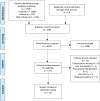Complications of Endoscopic Retrograde Cholangiopancreatography in Pediatric Patients; A Systematic Literature Review and Meta-Analysis
- PMID: 27663215
- PMCID: PMC5123955
- DOI: 10.1016/j.jpeds.2016.08.046
Complications of Endoscopic Retrograde Cholangiopancreatography in Pediatric Patients; A Systematic Literature Review and Meta-Analysis
Abstract
Objectives: To systematically review risks and summarize reported complication rates associated with the performance of endoscopic retrograde cholangiopancreatography (ERCP) in children during the past 2 decades.
Study design: A systematic literature search of MEDLINE, Embase, and Web of Science from January 1995 to January 2016 was conducted for observational studies published in English. Studies reporting ERCP complications in patients <21 years without history of liver transplant or cholecystectomy were included. A summary estimate of the proportion of children who experienced complications following ERCP was derived via a random effects meta-analysis.
Results: Thirty-two studies involving 2612 children and 3566 procedures were included. Subjects' ages ranged from 3 days to 21 years. Procedures were performed for biliary (54%), pancreatic (38%), and other (8%) indications; 56% of ERCPs were interventional. The pooled complication rate was 6% (95% CI 4%- 8%). Procedural complications included post-ERCP pancreatitis (166, 4.7%), bleeding (22, 0.6%), and infections (27, 0.8%). The pooled estimate of post-ERCP pancreatitis was 3% (95% CI 0.02-0.05), and other complications were 1% (95% CI 0.02-0.05). In the subgroup with neonatal cholestasis, the pooled complication rate was 3% (95% CI 0.01-0.07). Adult and pediatric gastroenterologists and surgeons performed the ERCPs. Available data limited the ability to report differences between pediatric-trained and other endoscopists.
Conclusions: Complications associated with pediatric ERCP range widely in severity and are reported inconsistently. Our review suggests 6% of pediatric ERCPs have complications. Further studies that use systematic and standardized methodologies are needed to determine the frequency and risk factors for ERCP-related complications.
Keywords: ERCP; children; endoscopist; hepatobiliary; neonatal cholestasis; pancreas; safety.
Copyright © 2016 Elsevier Inc. All rights reserved.
Conflict of interest statement
The authors declare no conflicts of interest.
Figures



Comment in
-
Complications of endoscopic retrograde cholangiopancreatography in children with chronic pancreatitis depends on center experience.J Pediatr. 2017 Jul;186:215-216. doi: 10.1016/j.jpeds.2017.02.076. Epub 2017 Mar 20. J Pediatr. 2017. PMID: 28336144 No abstract available.
-
Reply.J Pediatr. 2017 Jul;186:216. doi: 10.1016/j.jpeds.2017.03.001. Epub 2017 Mar 29. J Pediatr. 2017. PMID: 28365024 No abstract available.
References
-
- Waye JD. Endoscopic retrograde cholangiopancreatography in the infant. Am J Gastroenterol. 1976;65(5):461–3. - PubMed
-
- Fox VL, Werlin SL, Heyman MB. Endoscopic retrograde cholangiopancreatography in children. Subcommittee on Endoscopy and Procedures of the Patient Care Committee of the North American Society for Pediatric Gastroenterology and Nutrition. J Pediatr Gastroenterol Nutr. 2000;30(3):335–42. - PubMed
-
- Pant C, Sferra TJ, Barth BA, Deshpande A, Minocha A, Qureshi WA, et al. Trends in endoscopic retrograde cholangiopancreatography in children within the United States, 2000–2009. J Pediatr Gastroenterol Nutr. 2014;59(1):57–60. - PubMed
-
- Kamelmaz I, Elitsur Y. Pancreas divisum–the role of ERCP in children. The West Virginia medical journal. 1999;95(1):14–6. - PubMed
-
- Green JA, Scheeres DE, Conrad HA, Cloney DL, Schlatter MG. Pediatric ERCP in a multidisciplinary community setting – Experience with a fellowship-trained general surgeon. Surgical Endoscopy and Other Interventional Techniques. 2007;21(12):2187–92. - PubMed
Publication types
MeSH terms
Grants and funding
LinkOut - more resources
Full Text Sources
Other Literature Sources
Medical
Miscellaneous

